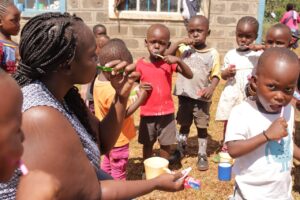INTRODUCTION
School Feeding Programs (SFPs) have become crucial interventions globally. They provide meals to millions of school going children while alleviating economic burdens on families and boosting local economies. Internationally, organizations such as the World Food Program (WFP) and UNICEF advocate for these initiatives, recognizing their role in reducing hunger, enhancing educational outcomes, and stimulating agricultural production. According to the WFP, over 368 million children benefit from worldwide.
Kenya has integrated school feeding into its education and social welfare policies nationally. Programs like the Home-Grown School Meals program (HGSMP) ensure that food is sourced locally, benefiting both students and local farmers. The government collaborates with development partners to expand these initiatives, particularly in arid and semi-arid regions where food insecurity is prevalent.
At the regional level, counties in Kenya have embraced school feeding initiatives to enhance enrollment and retention in schools. In counties like Turkana, Mandera, and Garissa, school feeding has been a critical lifeline, ensuring children remain in school despite food insecurity. These programs also create job opportunities in food supply chains and school meal preparation.
In Homa Bay County, where many families struggle with economic hardships, school feeding has been a game-changer. Many children come from low-income households, and access to daily school meals reduces financial strain on families, allowing parents to allocate limited resources to other essential needs.
Economic Impact on Families and Communities
School Feeding Programs contribute to local economies in several ways.
- They relieve families of the financial burden of providing daily meals for school-going children. This allows households to channel funds towards healthcare, housing, and small business investments. Studies show that when children receive free meals at school, household food insecurity decreases significantly.
- SFPs create employment opportunities. Local farmers benefit from the demand for produce used in school meals, fostering agricultural growth and stability. Additionally, suppliers, transporters, and food handlers involved in the program experience economic upliftment.
- SFPs contribute to increased school attendance and improved academic performance. Well-nourished children are more likely to concentrate in class, leading to better long-term economic prospects through improved education outcomes. This ultimately translates to a more skilled workforce, driving economic growth in communities.
Tajizuri’s Role in Supporting Families and Communities
Tajizuri has played a crucial role in Homa Bay County’s School Feeding Programs, directly benefiting families and the broader community. Through strategic partnerships and funding, Tajizuri has ensured that hundreds of school going children receive nutritious meals daily.
Additionally, Tajizuri’s program has empowered women and youth by creating job opportunities in food preparation and distribution. Many community members are employed as cooks, caterers, and suppliers, boosting household incomes and fostering economic independence.
Tajizuri’s efforts has long-term benefits on education. With guaranteed meals, school attendance and retention rates have improved significantly. Families that previously struggled with food insecurity can now focus on other economic activities without worrying about their children’s nutritional needs.
Conclusion
School Feeding Programs have a far-reaching economic impact on families and communities, from reducing household financial burdens to creating employment and stimulating local economies. In Homa Bay County, Tajizuri’s intervention has not only improved children’s nutrition and school attendance but also strengthened the economic fabric of the community. As such, expanding and sustaining these initiatives is crucial in fostering economic stability and social development.
Prepared by;
Awino Victor
Program officer.




